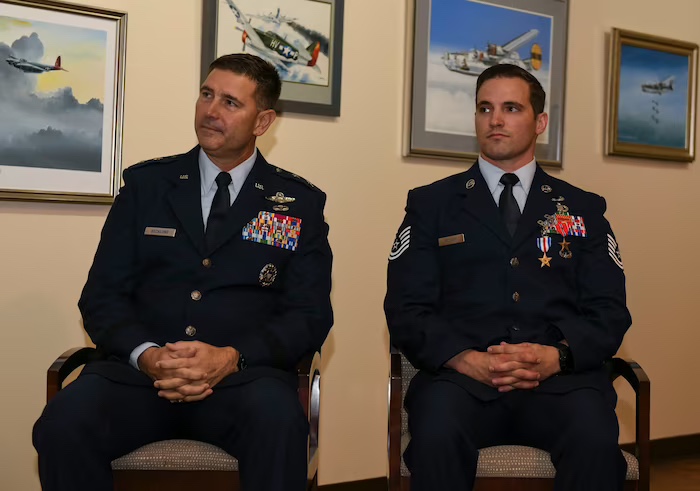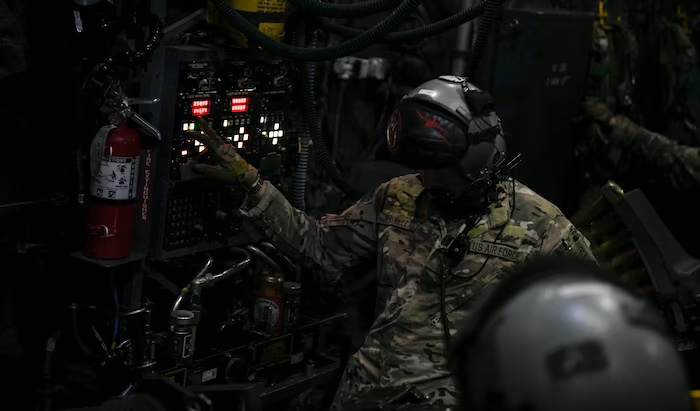ARLINGTON, Va. (AFNS) —
Some missions require exceedingly specialized skills and knowledge to be successful in highly contested environments. To win in these environments, highly trained battlefield Airmen embed with Army, Navy and Marine units to provide lethal airpower in the fight.
During a deployment in support of Operation Freedom Sentinel and Resolute Support, one such Air Force Special Warfare Tactical Air Control Party Specialist Tech. Sgt. Cam Kelsch, put years of training and preparation into action by providing guided precision strike airpower as close as 35 meters away to turn the tide of battle against an overwhelming enemy ambush.

In the span of six hours, with no regard for his own safety, he stepped into heavy enemy fire, and directed dozens of 40 mm and 105 mm rounds, two 500-lbs. bombs and saved the life of a wounded teammate … even after being shot himself in the chest plate.
Kelsch, alongside Army Rangers and Afghan special forces, were directed to find a high-value target in enemy-held territory. With clear skies and the moon’s illumination sitting high at 90%, Kelsch’s team made first contact with enemy forces outside of the target compound.
According to Kelsch, the contact resulted in a small firefight that quickly neutralized the enemy.
As the team successfully secured the target compound and interdicted the targeted individual, the force continued to encounter small enemy forces. Intelligence gathered during the operation within the compound led Kelsch and his team to believe there was a second high-value target nearby.
Due to the brightness of the night, Kelsch utilized the oversight of an AC-130-U “Spooky” gunship to develop a low-profile route for the assault force to maneuver to the next target compound: a creek bed with a 1-foot-wide path.
“When we were down in the creek bed, it was pitch black because we were covered in trees, and there were high walls on either side of us,” Kelsch said.
Then … chaos.
“It was like a bomb went off,” Kelsch said. “It was so bright and looked like fireballs going off all around me.”
Kelsch and his team were ambushed by enemy forces using assault rifles, fragmentation grenades and belt-fed machine guns.
“The fire was so overwhelming, I couldn’t stick my head out,” Kelsch said. “Bullets were ricocheting; dirt was being kicked up.”
Another teammate called out the position of the attackers … a mere 40 meters away.
“I realized that I had to get eyes on target, so I had to leave the protection of cover,” Kelsch said.
With no regard for his own safety, Kelsch exposed himself to fire to conduct danger close air strikes from the AC-130 with 40mm rounds to suppress the threat, several only 35 meters away from his position.

“If it weren’t for the true competency of that AC-130 crew, I wouldn’t be here today,” Kelsch said. “The aircrew really brought their A-game that night and made sure we got out of there.”
With a moment without fire in all directions, Kelsch and his ground force commander seized the opportunity to recover their wounded teammate. While dragging him to safety, Kelsch took a direct hit to the magazine on his chest rack the plate in his armor caught the bullet.
Upon recovering his wounded teammate and receiving more enemy fire, Kelsch opted to upgrade to the 105 mm rounds from the gunship, still danger close to his fighting position. The effective munitions proved enough to allow Kelsch and his team to fall back roughly 100 meters, but not before suffering an Afghan casualty.
At that time, the team elected to call for extraction.
To ensure aircraft could land so close to the ambush site, Kelsch directed a coordinated attack from two F-16 Fighting Falcons using precision-guided 500-lbs. bombs, neutralizing all remaining threats.
In the end, Kelsch’s actions played a role in completing a successful mission, suppressing multiple prepared forces and saving the lives of the joint special operations forces members. In 2019, for his gallantry in action that day, Kelsch was awarded the Silver Star, the third-highest award for valor in combat.
Secretary of the Air Force Public Affairs


I guess the USAF doesn’t see much value in TACPs in the future: https://www.airforcetimes.com/news/your-air-force/2023/04/14/air-force-looks-to-cut-nearly-50-of-tactical-air-control-party-jobs/
There’s a bunch of reasons for it. The biggest is ATAK. It facilitates the control of CAS by a wider range of personnel.
As well as SOTACC.